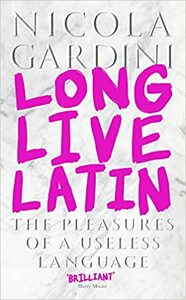Take a photo of a barcode or cover
read the few essays i wanted to and didn’t really care about the others. really enjoyed what i did read though!
informative
inspiring
slow-paced
I picked this up in a museum gift shop on vacation, having opened to a random paragraph about the Latin word fartus. It amused me, and I thought it might be a Bill Bryson-esque take on Latin. It’s not that at all; instead, it’s a survey of Roman authors and their use of Latin, how they pushed the language and created a foundation for Western thought and expression. There’s just enough background information on each author and their major works to contextualize the linguistic analyses of their Latin usage, and just enough Latin to rekindle positive memories of my high school Latin studies. Some of these authors I’ve studied and others remain in my reading future. The book thus becomes a great road map for middle-aged classical studies.
informative
medium-paced
I realize this book has a niche audience, and I am admittedly a Latin teacher and classics enthusiast. However, the book is not just about Latin, which Nicola Gardini masterfully explains is NOT a dead language. Rather, it is a series of chapters each devoted to one of the extraordinary authors who wrote in Latin. Whether you can read Latin or a translation, the author waxes poetic about Catullus, Cicero, Caesar, Lucretius, Virgil, Ovid, Livy, and others. It is truly about the power of language and the legacy of masterfully written words.
One of my favorite stories from the book was in the Seneca chapter. The author wrote about a friend whose 33-year-old partner was killed in Iraq while on a journalistic assignment. The author sent the grieving man a copy of Seneca’s work about Marcia and wrote:
“I had no doubt that in that moment Seneca’s words would be far more precise and worthy than anything I could say or put to paper. Some would argue that in the face of death, especially violent death, no words exist: that words must not exist. I admit, words are not the only way of expressing our emotions. But I’m still convinced of one thing: that we all have the right to count on words, at any time of life, even the most difficult; that it’s right to put our faith in words; and that when they come to us, we should never be embarrassed to use them. Our linguistic inadequacy might lead others to feel uncomfortable; but it must never lead us to relinquish our words in preemptive fear. If we can’t find them in ourselves, we must look for them in others.”
One of my favorite stories from the book was in the Seneca chapter. The author wrote about a friend whose 33-year-old partner was killed in Iraq while on a journalistic assignment. The author sent the grieving man a copy of Seneca’s work about Marcia and wrote:
“I had no doubt that in that moment Seneca’s words would be far more precise and worthy than anything I could say or put to paper. Some would argue that in the face of death, especially violent death, no words exist: that words must not exist. I admit, words are not the only way of expressing our emotions. But I’m still convinced of one thing: that we all have the right to count on words, at any time of life, even the most difficult; that it’s right to put our faith in words; and that when they come to us, we should never be embarrassed to use them. Our linguistic inadequacy might lead others to feel uncomfortable; but it must never lead us to relinquish our words in preemptive fear. If we can’t find them in ourselves, we must look for them in others.”
One of the best books about Latin for the non-Latinist I have ever read!
I do love the genre of the apologia for Latin - I have quite a collection - but this one is quite good, extolling the virtues of Latin in terms with which I can agree and in ways I understand, and exhorting the presumed English-speaking audience (of this translation) to take up the study of Latin in any way that they can, for reasons which are self-evident in the minds of most Latinists, but which we forget require explicit explanation to the uninitiated. Highly recommended for everyone - especially if you DON'T know Latin!
I do love the genre of the apologia for Latin - I have quite a collection - but this one is quite good, extolling the virtues of Latin in terms with which I can agree and in ways I understand, and exhorting the presumed English-speaking audience (of this translation) to take up the study of Latin in any way that they can, for reasons which are self-evident in the minds of most Latinists, but which we forget require explicit explanation to the uninitiated. Highly recommended for everyone - especially if you DON'T know Latin!
I definitely would have liked this better if I had read it with my eyes, but I also might have skipped over more of the Latin passages. I like reading books by people who feel really passionate about the topic they're writing about, and that definitely comes across here. This book is very detail oriented, so if you're not interested in the minute details of how language functions, you may struggle even more with this one.
informative
inspiring
reflective
medium-paced
hopeful
informative
inspiring
reflective
medium-paced



